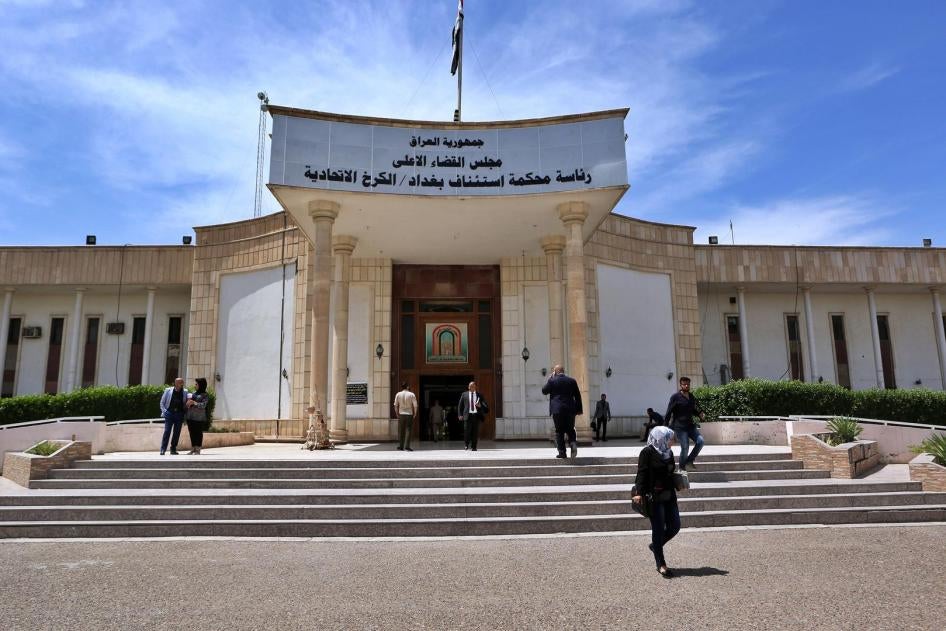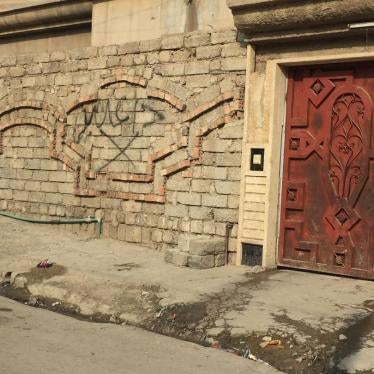(Beirut) – Two French citizens tried in recent days in Iraq for affiliation with the Islamic State (also known as ISIS) have alleged that they were tortured or coerced to confess, Human Rights Watch said today.
Seven French citizens were sentenced to death in the trials between May 26 and 29, 2019, and another’s verdict was postponed. At least one defendant said that Iraqi officers tortured him and another said that officers forced him to confess under duress and to sign a statement he could not read. Despite these allegations, the French foreign minister, Jean-Yves Le Drian, stated on May 29 that the defendants had “fair trials.”
“France and other countries should not be outsourcing management of their terrorism suspects to abusive justice systems,” said Lama Fakih, acting Middle East director at Human Rights Watch. “These countries should not be sitting idly by while their citizens are transferred to a country where their right to a fair trial and protection from torture are undermined.”
The men are part of a group of foreign detainees, including at least 11 French nationals, whom the US-backed Syria Democratic Forces (SDF) transferred from northeast Syria to Iraq in early 2019. In these cases, because of the risk of torture and absence of fair trials, the transfers are unlawful, Human Rights Watch said. These abuses highlight the urgent need for countries like France that can guarantee due process, to ensure that their nationals can return to their home country. There, any national suspected of war crimes, torture, or other international crimes should be investigated and, if appropriate, prosecuted in trials that meet internationally accepted fair-trial standards.
The Karkh branch of Iraq’s Central Criminal Court sentenced seven French citizens to death for ISIS affiliation and postponed the verdict of an eight, who alleged in court that he was tortured, until June 2. Court sources said that the other French nationals the SDF transferred from Syria will be charged and sentenced by the court in the coming days, including three on June 3.
One French defendant who appeared in court on May 27 told the court that officers tortured him in detention, two trial observers told Human Rights Watch. The presiding judge had the defendant lift his shirt, saw marks on his back and shoulder, and ordered a forensic medical exam and for the defendant to reappear in court on June 2. The judge did not ask for details about where or when the torture occurred, who had tortured him, or in what way, one observer said.
The observers said that a French defendant who was sentenced to death told the judge that officers had forced him under duress to confess and to sign a statement in Arabic that he could not understand. The observers said they understood his reference to duress to mean that he might be implying he was tortured. The judge asked him to lift his shirt and seemingly because there were no obvious signs of torture, sentenced him to death without asking any questions regarding the allegation.
Human Rights Watch has documented Iraqi interrogators using a range of torture techniques, including beating suspects on the soles of their feet, internationally known as “falaka,” and waterboarding, which would not leave lasting marks on the person’s body. Despite extensive, credible reports of torture in detention, Human Rights Watch has also documented the routine failure of the Iraqi justice system to credibly investigate torture allegations.
Over the last few years, Iraqi detainees charged with ISIS affiliation have been subjected to unfair trials that end with the death penalty. With the exception of one court, the trials Human Rights Watch has observed since 2016 have consisted of a judge briefly interviewing the defendant, usually relying solely on a confession, often coerced, with no effective legal representation. Authorities have also made no efforts to solicit victim participation in the trials, even as witnesses.
The United Nations Convention against Torture prohibits the transfer of detainees to a country where “there are substantial grounds for believing” they would be in danger of being tortured. Customary international law has a similar prohibition.
Several thousand Iraqi suspects and more than 2,000 non-Iraqi foreign ISIS suspects detained in northeast Syria by the SDF are at risk of transfer to Iraq for prosecution, with negotiations underway. In 2018, Human Rights Watch documented that the United States also transferred foreign ISIS suspects in northeast Syria to Iraq without apparent regard for the risk of torture and unfair trials in Iraq. A Reuters investigation documented at least 30 such transfers.
Neither the SDF nor any country should transfer detainees to Iraq for prosecution for terrorism or related crimes given the risk of torture and unfair trials, leading to the death penalty. In cases in which detainees have already been transferred to Iraq, those who transferred them are obligated under international law to monitor their cases to ensure that suspects are not mistreated and, if prosecuted, are tried fairly.
Countries with fair justice systems should take all possible measures to ensure that their nationals in custody in northeast Syria can return to their home country, where those suspected of war crimes and other international crimes should be investigated. These countries should ensure that trials of those charged with international crimes including rape, torture, killings, and other war crimes allow for victim and witness participation.
For detainees in Iraqi custody, judges should investigate all credible allegations of torture and the security forces responsible, and order transfers of detainees to different facilities immediately after they allege torture or ill-treatment, to protect them from retaliation.
Human Rights Watch opposes the death penalty in all countries and under all circumstances. In Iraq, where the trials of ISIS suspects fail to meet even the most basic markers of due process, its application is of particular concern.
“The serious flaws in the Iraqi prosecutions, including torture, have been well documented,” Fakih said. “If countries like France do not want their nationals to face the death penalty, as representatives have claimed to the media, then they should bring them home for investigation and prosecution.”









